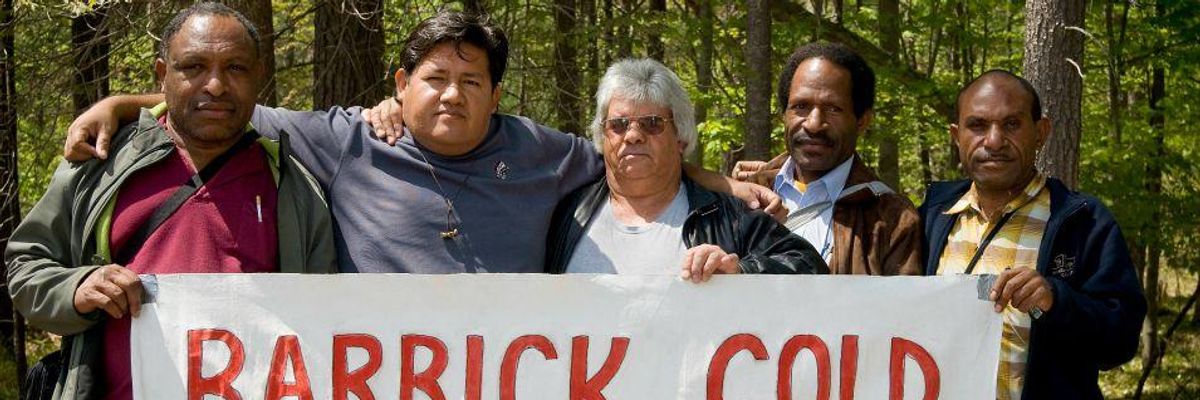Highlighting how corporate extractivism and lack of accountability is driving the destruction of Latin American communities, a Canadian mining company has now confirmed that more than one million liters of cyanide solution spilled from the Barrick Gold Veladero mine in San Juan, Argentina this month--making the spill more than four times larger than originally estimated.
"Far from ensuring that mining-affected communities enjoy the full range of protection under the law, governments--including the Canadian government--have twisted the law to protect and promote mining interests by targeting community activists and defenders."
--Jen Moore, MiningWatch Canada.
The Toronto-headquartered mining company initially said it had spilled just 224,000 liters of the toxic liquid, used to leach gold from processed rocks, into the Potrerillos River. On Wednesday, the corporation amended its statement (pdf) and said that in fact 1.072 million liters of a cyanide and water solution were spilled due to a failure in one of the valves in the mine's pipes.
The spill occurred on September 12, "and news quickly spread among local residents through social media, causing them to stockpile bottled water in fear," the Argentina Independent reported Thursday. Last week, thousands rallied together in the city of Jachal to protest the mining company.
Barrick--dubbed one of "The 12 Least Ethical Companies in the World" by the Swiss research firm Covalence in 2010--claims that "no risks to human health were identified."
But a joint statement from the Environment and Natural Resources Foundation (FARN), Greenpeace Argentina, and the Argentine Association of Environmental Lawyers, made it clear that environmental protection groups remain unconvinced about the long-term impact of the spill.
"Even if the judge is understood to have put into place a series of conditions, we are concerned by the secrecy with which the incident was handled, the scarce information about the circumstances of the event provided by the authorities and the risk management measures and contingencies," said (Spanish) Pia Marchegiani of FARN. "They cannot continue to handle affairs that are so delicate, that affect the environment and people this way."
The groups are criticizing a judge's decision on Thursday to lift orders suspending operations of the mine, suggesting that the local government conspired with Barrick to cover-up the magnitude of the leak and its potential consequences.
Just this week, MiningWatch Canada and the International Civil Liberties Monitoring Group released a damning report linking Canadian mining interests throughout the Americas with intensifying repression and violence against mining-affected communities.
The new report--entitledIn the National Interest? Criminalization of Land and Environment Defenders in the Americas--argues that "the model of industrial mineral extraction that Canada promotes abroad is informed by deregulation of the extractive sector at home and a colonialist past and present that--with renewed fervor in recent years--views those who speak out as a threat to the national interest and hence a target for spy agencies, tax audits, funding cuts, and gratuitous policing."
"Far from ensuring that mining-affected communities enjoy the full range of protection under the law, governments--including the Canadian government--have twisted the law to protect and promote mining interests by targeting community activists and defenders," said Jen Moore, Latin America program coordinator for MiningWatch Canada. "It has become a low-intensity war against communities and organizations who are fighting for environmental justice in Latin America."
